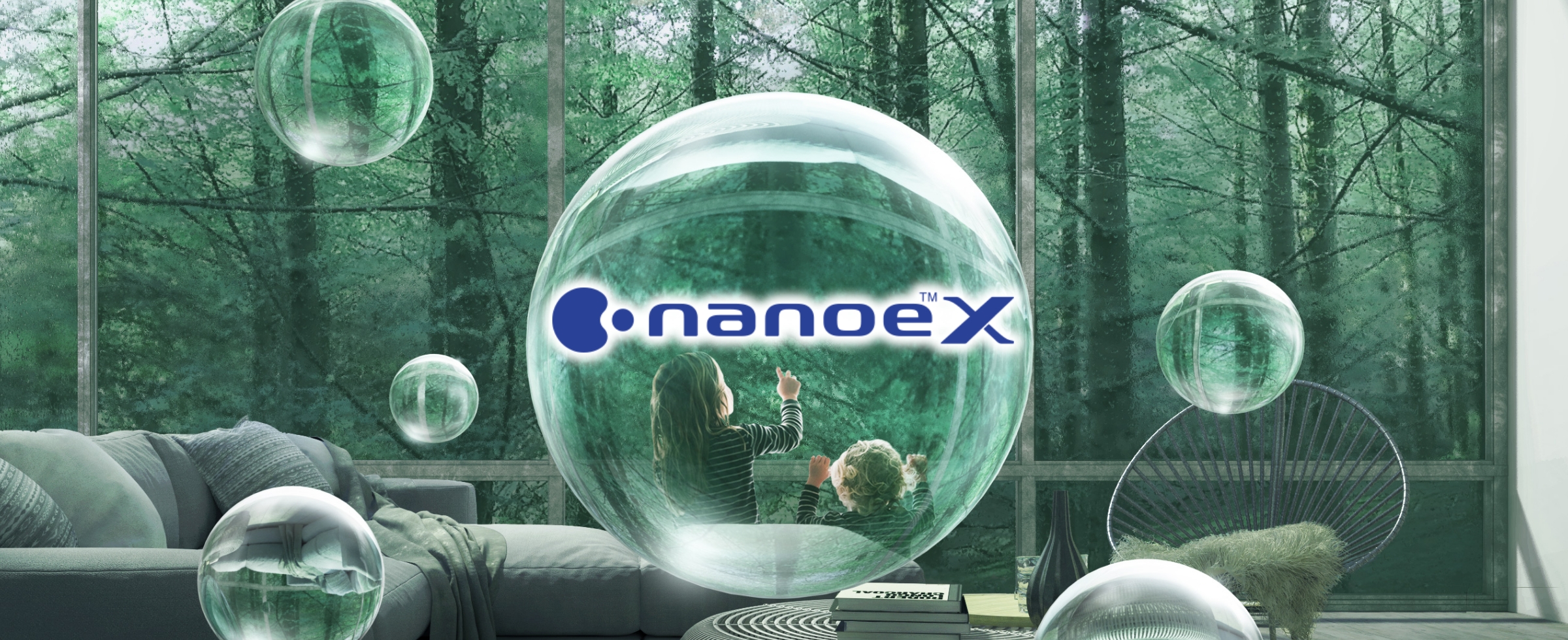Breathe freely. Contact confidently. Live safely.
Abundant in nature, hydroxyl radicals have the capacity to inhibit pollutants. nanoe™ X, technology can bring these incredible benefits indoors so that hard surfaces, soft furnishings, and the indoor environment can be a cleaner and pleasant place to be.
In today’s health-conscious world, we care about taking exercise, we care about what we eat and what we touch, we also care about what we breathe.
UPDATED CONTENTS
nanoe™ X—technology with
the benefits of hydroxyl radicals

nanoe™ X, the original ionizer to generate “nano-sized atomized water particles” is developed by Panasonic. It is an electrostatic atomization technology, that collects invisible moisture in the air and applies high voltage to it to produce “hydroxyl radicals contained in water”. The decisive factor is the existence of hydroxyl radicals inside nanoe™ X.
The water particles contain huge quantity of hydroxyl radicals. They are highly reactive molecules that react easily on a variety of substances, deodorizing and inhibiting viruses and bacteria.
Hydroxyls radicals are generally described as easily denatured through their binding to various substances in the air and very short lived.
However, it was verified that “hydroxyl radicals contained in water” have a long life because they are contained in water and this makes their effects far-reaching.
Panasonic’s “hydroxyl radicals contained in water” has been researched and developed for more than 20 years, establishing its brand name as “nanoe™ X”.
nanoe™ X: improving protection 24/7
Effects of nanoe™ X—unique Panasonic technology
What’s unique about nanoe™ X?

Microscopic scale
At one billionth of a cubic metre, nanoe™ X particles are much smaller than steam particles, so they penetrate deep into fabrics to deodorise.

Longer Lifespan
Contained in water, nanoe™ X hydroxyl radicals have a longer lifespan, so they disperse more widely throughout the room.

Huge volume
nanoe™ X Generator Mark 2 produces 9.6 trillion hydroxyl radicals per second. This increased volume of hydroxyl radicals generated by nanoe™ X translates to higher performance in inhibiting pollutants.

Maintenance-free
No maintenance, no replacement required: nanoe™ X is generated with a device made of titanium that does not require maintenance.
Note: Image shows nanoe™ X Generator Mark 2

Fills Space actively
nanoe™ X actively fills the entire room and goes beyond the filter to inhibit adhered and airborne pollutants.

Safe and non-chemical particles
The safety of nanoe™ X has been tested in laboratories and institutions.
Recreating Nature's Balancing Process Indoors
Panasonic's nanoe™ X technology uses hydroxyl radicals contained in water to improve indoor air quality for your health and comfort. Hydroxyl radicals are known as ‘nature’s detergent’ because they are naturally occurring unstable molecules which inhibit the growth of pollutants in the air by seizing their hydrogen atoms to neutralize their unpleasant effects. Panasonic’s nanoe™ X technology recreates this natural cleansing process indoors to effectively inhibit various types of pathogens and pollutants found in the air and on surfaces.
Thanks to the characteristics of nanoe™ X, pollutants can be inhibited.

nanoe™ X reaches pollutant.

Hydroxyl radicals denature pollutant proteins.

Pollutant is inhibited.
Benefits of Panasonic Air Conditioner
Keep your loved ones comfortable and healthy with features like nanoe™ X technology to provide all day protection against pathogens, pollutants and harmful fumes. Enjoy faster and healthier cooling without compromising on energy efficiency.

24-hour nanoe™ X Protection

Virus Inhibiting Technology

Healthier Cooling & Faster Airflow
Discover Panasonic nanoe™ X products
nanoe™ X technology is incorporated into a wide range of Panasonic products to keep you safe indoors.
Whatever your needs and lifestyle may be, we have the ideal air solution for you.





























